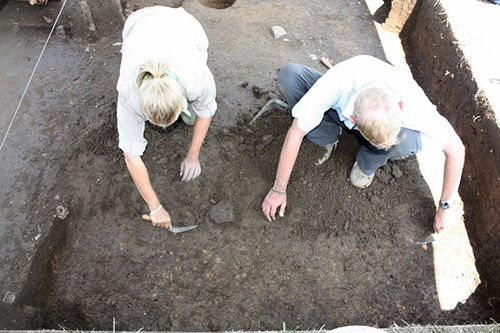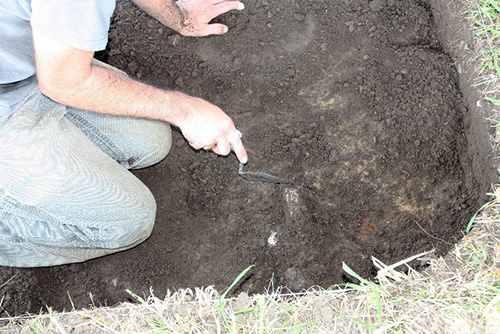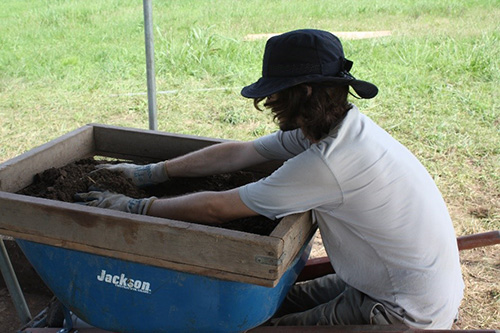 Carl Drexler (station archeologist at the Arkansas Archeological Survey SAU station) and Emily Beahm (station archeologist at the Arkansas Archeological Survey WRI station) are working with Carol Colaninno (research assistant professor at the Southern Illinois University Edwardsville STEM Center) and Shawn Lambert (assistant professor at Mississippi State University) on a research project aimed at making archeological field schools safer and more inclusive for all students. This research will ultimately benefit not only archeological field schools, but archeological fieldwork in other contexts as well as other field-based disciplines, and will improve the overall quality of archeological research for the future. The team has already researched what others are doing to prevent and reduce sexual harassment and assault. This work can be found in the May issue of Advances in Archaeological Practice.
Carl Drexler (station archeologist at the Arkansas Archeological Survey SAU station) and Emily Beahm (station archeologist at the Arkansas Archeological Survey WRI station) are working with Carol Colaninno (research assistant professor at the Southern Illinois University Edwardsville STEM Center) and Shawn Lambert (assistant professor at Mississippi State University) on a research project aimed at making archeological field schools safer and more inclusive for all students. This research will ultimately benefit not only archeological field schools, but archeological fieldwork in other contexts as well as other field-based disciplines, and will improve the overall quality of archeological research for the future. The team has already researched what others are doing to prevent and reduce sexual harassment and assault. This work can be found in the May issue of Advances in Archaeological Practice.
Field schools are a critical part of archeological education. For many programs, some type of field school is required to graduate with a degree in anthropology. A recent survey of archeologists conducting research in the southeastern United States (Meyers et al. 2018) has documented the problem of sexual harassment and assault in archeological field research settings in the southeastern United States. This is a documented issue in many disciplines that require field-based research. Research has also found that students who are historically underrepresented in science, engineering, and technology fields such as women, students of color, students who identify as LGBTQ+, and students with diverse abilities have an increased likelihood of being harassed compared with individuals outside these groups. We have clear documentation of this problem. Now it is time to take steps to address and fix the problem.
The Southern Illinois University Edwardsville STEM Center, in collaboration with the Arkansas Archeological Survey and Mississippi State University, are now in the first phase of a three phase project to see what strategies field school directors are currently using to create a safe and inclusive archeological field school environment for their students and staff, and to assess how well these strategies work in practice. This research has been funded by the National Science Foundation (Award No. 1937392).
 The primary aim of this research project is to document and determine the practices and procedures that promote harassment- and assault-free environments for undergraduate students at archeological field schools. The aim of this research is to address the following questions:
The primary aim of this research project is to document and determine the practices and procedures that promote harassment- and assault-free environments for undergraduate students at archeological field schools. The aim of this research is to address the following questions:
1) Are there practices and procedures commonly implemented by field directors with potential to create a field school that is free of sexual harassment, assault, and violence?
2) What policies and procedures are most frequently implemented among field schools and are these policies and procedures perceived as effective?
3) Do additional policies and procedures emerge among field schools as effective?
4) How can these policies and procedures be broadly implemented to increase field school safety and inclusion among diverse field schools?
This research is important, not only for the well-being and safety of students, but also for the good of archeology as a discipline. Harassment of students, particularly those in traditionally underrepresented groups, may cause students to leave the field. When this occurs, archeology loses intellectual diversity and diversity of personal experiences that would bring important different perspectives to archeological research, leading to new insights about past societies.
References Cited
Meyers, Maureen S., Elizabeth T. Horton, Edmond A. Boudreaux, Stephen B. Carmody, Alice P. Wright, and Victoria G. Dekle
2018 The Context and Consequences of Sexual Harassment in Southeastern Archaeology. Advances in Archaeological Practice 6(4):275–287.





